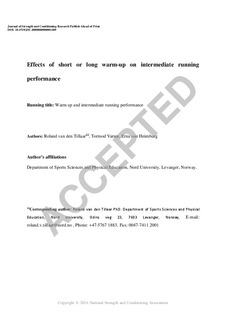Effects of Short or Long Warm-up on Intermediate Running Performance
Original version
van den Tillaar, R.J.W., Vatten, T. and von Heimburg, E.D. (2016). Effects of short or long warm-up on intermediate running performance. Journal of Strength and Conditioning Research, 31(1), 37-44. doi: 10.1519/JSC.0000000000001489Abstract
The aim of the study was to compare the effects of a long warm-up (general + specific) and a short warm-up (specific) on intermediate running performance (3-minute run). Thirteen experienced endurance-trained athletes (age 23.2 ± 2.3 years, body mass 79.8 ± 8.2 kg, body height 1.82 ± 0.05 m) conducted 2 types of warm-ups in a crossover design with 1 week in between: a long warm-up (10 minutes, 80% maximal heart rate, and 8 × 60 m sprint with increasing intensity and 1 minute rest in between) and a short warm-up (8 × 60 m sprint with increasing intensity and 1 minute rest in between). Each warm-up was followed by a 3-minute running test on a nonmotorized treadmill. Total running distance, running velocity at each 30 seconds, heart rate, blood lactate concentration, oxygen uptake, and rate of perceived exertion were measured. No significant differences in running performance variables and physiological parameters were found between the 2 warm-up protocols, except for the rate of perceived exertion and heart rate, which were higher after the long warm-up and after the 3-minute running test compared with the short warm-up. It was concluded that a short warm-up is as effective as a long warm-up for intermediate performance. Therefore, athletes can choose for themselves if they want to include a general part in their warm-up routines, even though it would not enhance their running performance more compared with only using a short, specific warm-up. However, to increase efficiency of time for training or competition, these short, specific warm-ups should be performed instead of long warm-ups.
